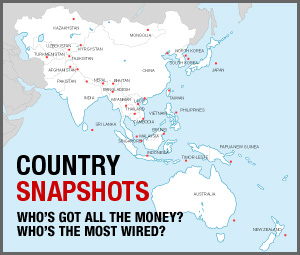The Future is Already Here
 Image: Jens Schott Knudsen
Image: Jens Schott Knudsen
By 2020, China will have the largest economy in Asia. Yet its leverage over other countries in the future is being exaggerated. China will still be a vulnerable stakeholder in the regional and global security and economic order. For example, it will still predominantly rely on energy and resources imports coming through the Indian Ocean and South China Sea, since energy pipelines and infrastructure through Central Asia and into western China will remain inadequate. This means that it remains dependent on open sea lanes and can ill-afford to suffer the unpredictable and punitive consequences of disrupting the current maritime order.
Moreover, China cannot truly dominate economic activity in Asia until its domestic market becomes the epicentre of consumption of the region. By 2020, China’s GDP per capita will still be one fifth that of the United States’ and Japan’s. There are also other factors that will work against a take-off in Chinese consumption. Because of its state-led development model, wealth is concentrated in the hands of the state sector rather than widely distributed to its people. Inequality in China, already the highest in Asia (in terms of the Gini coefficient), will further deteriorate. By 2015, more people will leave the Chinese workforce than enter it and its aging population does not bode well for its long-term economic future. In fact, it is arguable that India, with 50 percent of its population currently under 25-years old, will have the more vibrant and prosperous middle class. China will likely lack the economic weight and resources needed to ‘compel’ or seduce countries to accept a China-led order and reject the US-led one.
There’s also another future scenario that could profoundly imperil and distract China: serious China-Russia tensions and even the possibility of significant strategic Russian cooperation with US and key Asian allies. Russia is presently preoccupied with restoring its influence in parts of Eastern Europe. But it is watching with increased concern China’s unauthorized movements into Siberia and the Far East. Indeed, as China rises and Russia declines, Moscow sees restraining its increasingly dominant neighbour as the longer-term challenge. So far, Russia has done little about Chinese incursions simply because it has entered into a partnership of convenience with China as an immediate counterweight against the West. But Western tensions with Russia may not last. As a consequence, China fears that the longer-term strategic interests of Russia, Japan and the United States are worryingly aligned.
History to Repeat Itself?
A caveat: future speculation depends on assumptions, and we all know that when one makes assumptions, one inevitably makes a fool of oneself. But planning for the future must nevertheless be done.
In 2020, we’ll likely see an economically and militarily powerful, but strategically frustrated China. It will be accommodating and bullying in equal parts–too strong to meekly accept an order not of its own making but still too weak and isolated to substantially rework it. When it comes to issues such as Taiwan, China will be more likely to forcefully move to reclaim the island if the military balance in the Taiwanese Straits tips in its favour, since there’ll be immense pressure on the Communist Party for significant foreign policy achievements. But its ambitions in the South China Sea, and broader designs for leadership, are likely to be frustrated.
Bear in mind that a weak and failing China–which should not be discounted given immense domestic problems that appear to be worsening, including corruption, poor institutions, ineffective governance and unrest–could suffer another historical period of disorder and chaos. If this occurs, it will absorb the attention of its neighbours as they try to limit any fallout, and also deny the broader region important economic opportunities.
But there’s another, unpalatable, scenario that remains conceivable. A combination of factors such as a faster-than-expected US decline, loss of American enthusiasm for committing money and ships to uphold a free and open trade order and an emerging era of US and regional protectionism is conceivable. The dismantling of the US-led security order could follow, leading Asia-Pacific states to hastily reorganize security relations amongst themselves. Under such a scenario, the potential for the Asia-Pacific to repeat some of the tragic lessons of Twentieth century Europe would rise significantly.
Dr. John Lee is the foreign policy fellow at the Center of Independent Studies in Sydney and a visiting fellow at the Hudson Institute in Washington DC. He is the author of ‘Will China Fail?’ (CIS: 2009).
1Aaron Friedberg, ‘Will Europe’s Past be Asia’s Future?’, Survival, 42:3, 2000. 2Lee Kuan Yew, ‘India’s Peaceful Rise’, Forbes, 24 December 2007.










